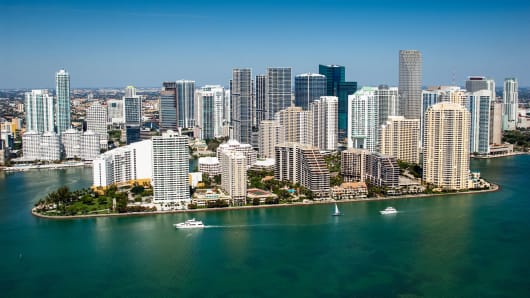"We're committed to customer service and efficiency, and ePlan helps us achieve this while also proving that resilience and innovation can be part of everything we do," said City Manager Emilio Gonzalez. "As part of our Service City Initiative, we continue streamlining our processes and making our services easily accessible to our residents and businesses."
In September 2018 the
SBA regional administrator, Ashley D. Bell, partnered with Mayor Suarez in signing a Strategic Alliance Memorandum, thereby creating a two-year partnership to foster business development and growth among Miami's vast entrepreneurial network.
Additionally, the
Miami-Dade Office of the Florida Small Business Development Center helps companies start, grow and succeed. Florida SBDCs have assisted hundreds of thousands of potential and existing business owners by providing the management advice, training and information needed to make sound business decisions in a complex and ever-changing marketplace. Florida SBDCs offer this business management and technical assistance at little or no cost.
Further, the
Miami-Dade Department of Procurement Management, which is charged with buying goods and services for the county, has streamlined operations, simplified procedures and documentation and brought in some of the best purchasing professionals available. Small business owners can register and enroll as eligible vendors with Miami-Dade County.
The economic boom has helped small businesses such as Miami-based JeisonGermanGroup.
"I started the business part-time; we're full time now just for the simple fact that we were able to uncover some really good opportunities that allowed us to really grow," said Jeison German of the JeisonGermanGroup, a four-year-old consulting company with $1.5 million in annual revenues that provides technology and merchant services for start-ups, small businesses and middle-market-size companies.
"My business is going to quadruple what we did last year, added German, whose 130 clients include restaurants, retail, B2B companies and financial firms.
"We have been fortunate to service the small business community in Miami since 2000. Miami continues to offer a dynamic and friendly business climate powered by a multicultural workforce and emerging opportunities across a multitude of industries," said Manuel Chinea, COO of Popular Bank.
Top 25 cities for small business in 2019 (2018 ranking in parentheses)
- Miami (No. 3)
- San Jose, CA (No. 2)
- San Francisco (No. 4)
- New York (No. 1)
- San Diego (No. 9)
- Los Angeles (No. 5)
- Boston (unranked)
- Sacramento, CA (No. 10)
- Baltimore (No. 16)
- Washington, DC (No. 7)
- Philadelphia (No. 22)
- Chicago (No. 12)
- Seattle (No. 14)
- Riverside, CA (No. 6)
- Minneapolis (unranked)
- Phoenix (No. 11)
- Las Vegas (No. 18)
- Charlotte, NC (No. 24)
- Nashville, TN (unranked)
- Raleigh, NC (unranked)
- Detroit (No. 20)
- Oklahoma City (unranked)
- Houston (No. 21)
- Cleveland (unranked)
- Pittsburgh (unranked)
Half of the Top 10 Best Cities for Small Business Growth are located in California: San Jose (No. 2), San Francisco (No. 3), San Diego (No. 5), Los Angeles (No. 6) and Sacramento (No. 8). These cities benefit from having a robust technology sector, an educated workforce, a solid tourism sector and nice weather.
Boston debuted on the list at No. 7 after not being ranked last year. Boston has a lot going for it, most notably a thriving tech sector and access to an educated workforce due to the large number of highly rated colleges and universities in the area.
Several cities located in the middle of the country that were not on the 2018 Top 25 ranking climbed onto the list this year: Minneapolis (No. 15), Nashville (No. 19) and Raleigh (No. 20), Oklahoma City (No. 22), Cleveland (No. 24), and Pittsburgh (No. 25). These cities benefit from lower cost structures than expensive places such as New York, San Jose and San Francisco.
The top 10 metro areas with highest annual revenue
- New York $1,273,960
- Miami $1,198,424
- San Jose, CA $1,190,007
- Washington, DC $1,101,367
- San Francisco $1,088,626
- Boston $947,624
- Oklahoma City $943,137
- Seattle $900,008
- San Diego $887,370
- Philadelphia $882,683
New York is still the place where the revenues are highest. This comes as little surprise. However, Miami is not that far behind, and that is one of the major reasons why it ranked No. 1 overall.
When sorted by Age of Business (in months), cities in the south and west, such as Oklahoma City, Nashville, Raleigh, Las Vegas and Charlotte, had the youngest average age of business, an indication of start-up growth. Cleveland and Detroit, two Midwestern cities with growing tech sectors, were the exceptions to the trend.
Miami's spot at No. 1 is interesting because it is not known as a technology hub in the way that New York, San Jose and San Francisco are. The lower cost structure in Florida makes it less expensive to do business there, and we are seeing a migration away from high-cost cities. Many of the cities in the Midwest have climbed on the list.
What we can take away from the study is that small businesses are doing well all across the country. The overall economy is still doing well by many measures: the
Dow Jones Industrial Average hovers around record highs, optimism among small business owners remains strong, and we continue to see solid job creation and low numbers for unemployment. Additionally, the
Federal Reserve has pulled back from its trend of continuously raising interest rates, so companies in need of capital still are getting low-cost funding. While nothing lasts forever, we remain in an economy that is ripe for small business growth.
Rohit Arora, special to CNBC.com, is also the co-founder and CEO ofBiz2Credit.










































